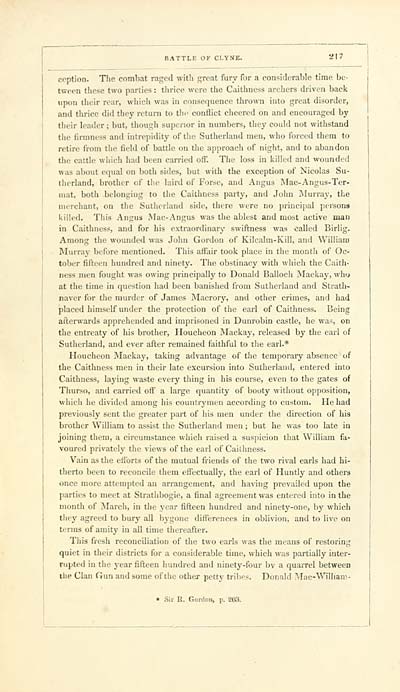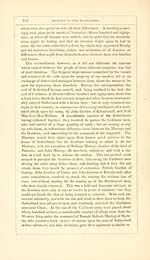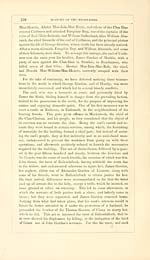Download files
Complete book:
Individual page:
Thumbnail gallery: Grid view | List view

BATTLE OP CLVNE. zl'
ccption. The combat raged with great fury for a considerable time be-
tirrcn these two parties : thrice were tlie Caithness arclicrs driven back
upon liicir rear, wliicli was in consequence thrown into great disorder,
and thrice did they return to thi> conflict cheered on and encouraged by
their leader ; but, though superior in numbers, they could not withstand
tiie firmness and intrepidity oftlie Sutherland men, who forced them to
retire from the field of battle on the approach of night, and to abandon
the cattle wliicii had been carried off. Tlie loss in killed and wounded
was about e(pial on both sides, but with the exception of Nicolas Su-
therland, brother of the laird of Forse, and Angus Mac-Angus-Ter-
mat, both belonging to the Caithness party, and Jolm Murray, the
nu-rchant, on the Sutherland side, there were no principal persons
killed. This Angus Mac-Angus was the ablest and most active man
in Caithness, and for his extraordinary swiftness was called Birlig.
Among the wounded was John Gordon of Kilcalra-Kill, and William
Murray before mentioned. This aft'air took place in the month of Oc-
tober fifteen hundred and ninety. The obstinacy with which the Caith-
ness men fought was owing principally to Donald Balloeli Mackay, who
at the time in question had been banished from Sutherland and Strath-
naver for the murder of James Macrory, and other crimes, and had
placed himself under the protection of the earl of Caithness. Being
afterwards apprehended and imprisoned in Dunrobin castle, he was, on
the entreaty of his brother, Houcheon Mackay, released by the earl of
Sutherland, and ever after remained faithful to the earl.*
Houcheon Mackay, taking advantage of the temporary absence of
the Caithness men in their late excursion into Sutherland, entered into
Caithness, laying waste every thing in his course, even to the gates of
Thurso, and carried off a large quantity of booty without opposition,
which he divided among his countrymen according to custom. He had
previously sent the greater part of his men under the direction of his
brother William to assist the Sutherland men ; but he was too late in
joining them, a circumstance which raised a suspicion that William fa-
voured privately the views of the earl of Caithness.
Vain as the efforts of the mutual friends of the two rival earls had hi-
therto been to reconcile them effectually, the earl of Huntly and others
once more attempted an arrangement, and having prevailed upon the
parties to meet at Strathbogie, a final agreement was entered into in the
month of IMarch, in the year fifteen hundred and ninety-one, by which
they agreed to bury all bygone differences in oblivion, and to live on
terms of amity in all time thereafter.
This fresh reconciliation of the two earls was the means of restoring
quiet in their districts for a considerable time, which was partially inter-
rupted in the year fifteen hundred and ninety-four bv a quarrel between
the Clan Gun and some of the other petty tribes. Donald Mac-William-
• Sir R. Gordon, p. 203.
ccption. The combat raged with great fury for a considerable time be-
tirrcn these two parties : thrice were tlie Caithness arclicrs driven back
upon liicir rear, wliicli was in consequence thrown into great disorder,
and thrice did they return to thi> conflict cheered on and encouraged by
their leader ; but, though superior in numbers, they could not withstand
tiie firmness and intrepidity oftlie Sutherland men, who forced them to
retire from the field of battle on the approach of night, and to abandon
the cattle wliicii had been carried off. Tlie loss in killed and wounded
was about e(pial on both sides, but with the exception of Nicolas Su-
therland, brother of the laird of Forse, and Angus Mac-Angus-Ter-
mat, both belonging to the Caithness party, and Jolm Murray, the
nu-rchant, on the Sutherland side, there were no principal persons
killed. This Angus Mac-Angus was the ablest and most active man
in Caithness, and for his extraordinary swiftness was called Birlig.
Among the wounded was John Gordon of Kilcalra-Kill, and William
Murray before mentioned. This aft'air took place in the month of Oc-
tober fifteen hundred and ninety. The obstinacy with which the Caith-
ness men fought was owing principally to Donald Balloeli Mackay, who
at the time in question had been banished from Sutherland and Strath-
naver for the murder of James Macrory, and other crimes, and had
placed himself under the protection of the earl of Caithness. Being
afterwards apprehended and imprisoned in Dunrobin castle, he was, on
the entreaty of his brother, Houcheon Mackay, released by the earl of
Sutherland, and ever after remained faithful to the earl.*
Houcheon Mackay, taking advantage of the temporary absence of
the Caithness men in their late excursion into Sutherland, entered into
Caithness, laying waste every thing in his course, even to the gates of
Thurso, and carried off a large quantity of booty without opposition,
which he divided among his countrymen according to custom. He had
previously sent the greater part of his men under the direction of his
brother William to assist the Sutherland men ; but he was too late in
joining them, a circumstance which raised a suspicion that William fa-
voured privately the views of the earl of Caithness.
Vain as the efforts of the mutual friends of the two rival earls had hi-
therto been to reconcile them effectually, the earl of Huntly and others
once more attempted an arrangement, and having prevailed upon the
parties to meet at Strathbogie, a final agreement was entered into in the
month of IMarch, in the year fifteen hundred and ninety-one, by which
they agreed to bury all bygone differences in oblivion, and to live on
terms of amity in all time thereafter.
This fresh reconciliation of the two earls was the means of restoring
quiet in their districts for a considerable time, which was partially inter-
rupted in the year fifteen hundred and ninety-four bv a quarrel between
the Clan Gun and some of the other petty tribes. Donald Mac-William-
• Sir R. Gordon, p. 203.
Set display mode to: Large image | Transcription
Images and transcriptions on this page, including medium image downloads, may be used under the Creative Commons Attribution 4.0 International Licence unless otherwise stated. ![]()
| Early Gaelic Book Collections > Ossian Collection > History of the Highlands and of the Highland clans > Volume 1 > (323) |
|---|
| Permanent URL | https://digital.nls.uk/79676473 |
|---|
| Description | Vol. I. |
|---|---|
| Shelfmark | Oss.247 |
| Additional NLS resources: | |
| Attribution and copyright: |
|
| Description | Selected books from the Ossian Collection of 327 volumes, originally assembled by J. Norman Methven of Perth. Different editions and translations of James MacPherson's epic poem 'Ossian', some with a map of the 'Kingdom of Connor'. Also secondary material relating to Ossianic poetry and the Ossian controversy. |
|---|
| Description | Selected items from five 'Special and Named Printed Collections'. Includes books in Gaelic and other Celtic languages, works about the Gaels, their languages, literature, culture and history. |
|---|

